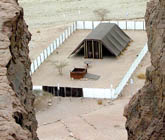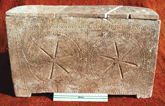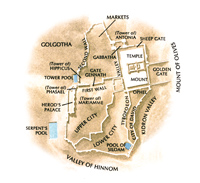×


We have detected your country as:
Please click here to go to the USA website or select another country from the dropdown list.

{image_1}No other place on Earth has quite the color and flair that Jerusalem does, and arguably, no other place in Jerusalem has quite the color and flair of Mahane Yehuda, Jerusalem’s largest open-air market, locally referred to as the shuk. A gem in the golden setting of central Jerusalem, the shuk dazzles with its feast of sights, sounds, smells, and tastes. The famous outdoor market bristles with activity daily—except for Shabbat, the Sabbath—as vendors display their wares to shoppers from dawn to dusk, and spice-laden fragrances permeate the alleyways.
Continue Reading »
{image_1}Although myriads of scholars have studied it, hundreds of authors have written about it, and generations of Bible believers have tried to make sense of it, few things in Scripture remain as misunderstood as the sacrificial system. The Torah (Gen.–Deut.) spends a great deal of time instructing the Israelites in the parameters of animal sacrifice to be performed in the Tabernacle and later in the Temple. Whether in dealing with various minor sins, the birth of a child, or celebrating the deliverance of the Lord, sacrifice was an integral part of the everyday life of ancient Israel.
Continue Reading »The Jewish people are unique among all the peoples of the earth. Their covenant relationship with God sets them apart, as does their adherence to the Torah (Gen.–Deut.). However, their ability to maintain their Jewish identity, the tenants of Judaism, and even unity as a people during millennia of dispersion and relentless religious persecution is unparalleled in human history.
Continue Reading »
{image_1}We are living in extraordinary times. The hand of G-d in the affairs of man is evident, and there is no greater proof of this than the ingathering of the exiles from the four corners of the earth. “Bring My sons from afar, and My daughters from the ends of the earth,” declares the L-rd (Isaiah 43:6). Over the past sixty years, since the founding of the State of Israel, that is precisely what He has been doing, as Jews from Russia, Ethiopia, and elsewhere have all heard the sound of the great shofar [ram’s horn] and come to Jerusalem.
Continue Reading »
{image_1}There are quilting bees and spelling bees, but now there’s a Bible Bee—the Holy Land Bible Bee, the product of Israeli ingenuity for English-speaking Christians. The term that the contest has been given, “bee,” is quite fitting, as its origin may come from the Old English word “ben” for “prayer.” But for North Americans, it was a popular term used during colonial times, when spinning bees, corn husking bees, apple bees, and logging bees were common. They were get-togethers of the larger community for a common purpose that usually included a social event.
Continue Reading »
{image_1}Three years ago, the Israel Antiquities Authority (IAA) Unit for the Prevention of Antiquities Robbery acquired an ossuary with an Aramaic inscription on the top edge just below its lid: “Miriam daughter of Yeshua son of Caiaphas, priests [of] Ma'aziah from Beth ’Imri.” Dr. Boaz Zissu of Bar Ilan University and Professor Yuval Goren of the Tel Aviv University were commissioned to check its authenticity. At the end of June this year, they published the results of their examination—it is, indeed, genuine and ancient.
Continue Reading »
{image_1}The clearing of Jerusalem’s Second Temple Period water channel, a seven-year project, was reported in our April Dispatch. Now we’re receiving reports of what was found there. The channel runs south from Robinson’s Arch (just south of the Western Wall) along the western edge of the City of David to Siloam Pool (at the end of Hezekiah’s Tunnel). Soon it will open to the public; meanwhile, the exciting finds that were unearthed there breathe new life into the story of the destruction of the Second Temple.
Continue Reading »
{image_1}On July 10th, Israel ratified an agreement with Cyprus which sets Israel's maritime borders. Lebanon has rejected the borders set by the two countries, claiming the state [Israel] is impinging on its naval territory, but [Israel] Foreign Minister Avigdor Lieberman said Israel would not cede “one centimeter.” Lieberman also denied reports that the United States supports Lebanon's claims, calling them “nonsense.”
Continue Reading »
{image_1}World leaders speak about the need for a two-state solution for the Israeli–Palestinian conflict, frequently using the catch phrase “two states for two peoples.” Surprisingly, voices have been raised recently calling for a one-state solution. Yoram Ettinger, a former consul-general of the Israeli Consulate in Houston in the United States and now the CEO of “Second Thought: A US–Israel Initiative” spoke to Bridges for Peace about his ideas.
Continue Reading »
{image_1}When we think of all the creatures referenced in the Bible, especially those mentioned for food, fish probably isn’t the first thing that comes to mind. The sacrificial system which fed the priesthood, the meals prescribed for celebrating the various feast days, and the fatted calf that fed the ancient visitor were all based on red meat. As such, cattle are mentioned many times in the Scriptures. In the earliest references, the use of the word simply means “domesticated animal” and might have included other species. And of course, sheep and goats are referred to literally hundreds of times. No wonder we think of these creatures first.
Continue Reading »All logos and trademarks in this site are property of their respective owner. All other materials are property of Bridges for Peace. Copyright © 2025.
Website Site Design by J-Town Internet Services Ltd. - Based in Jerusalem and Serving the World.